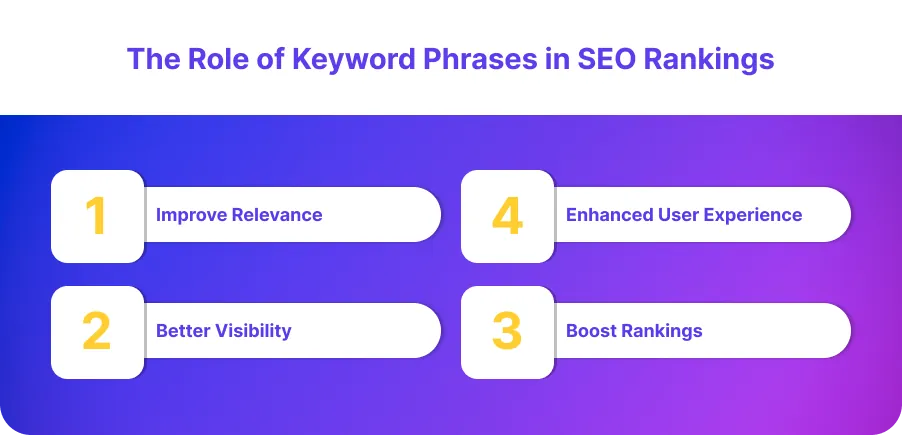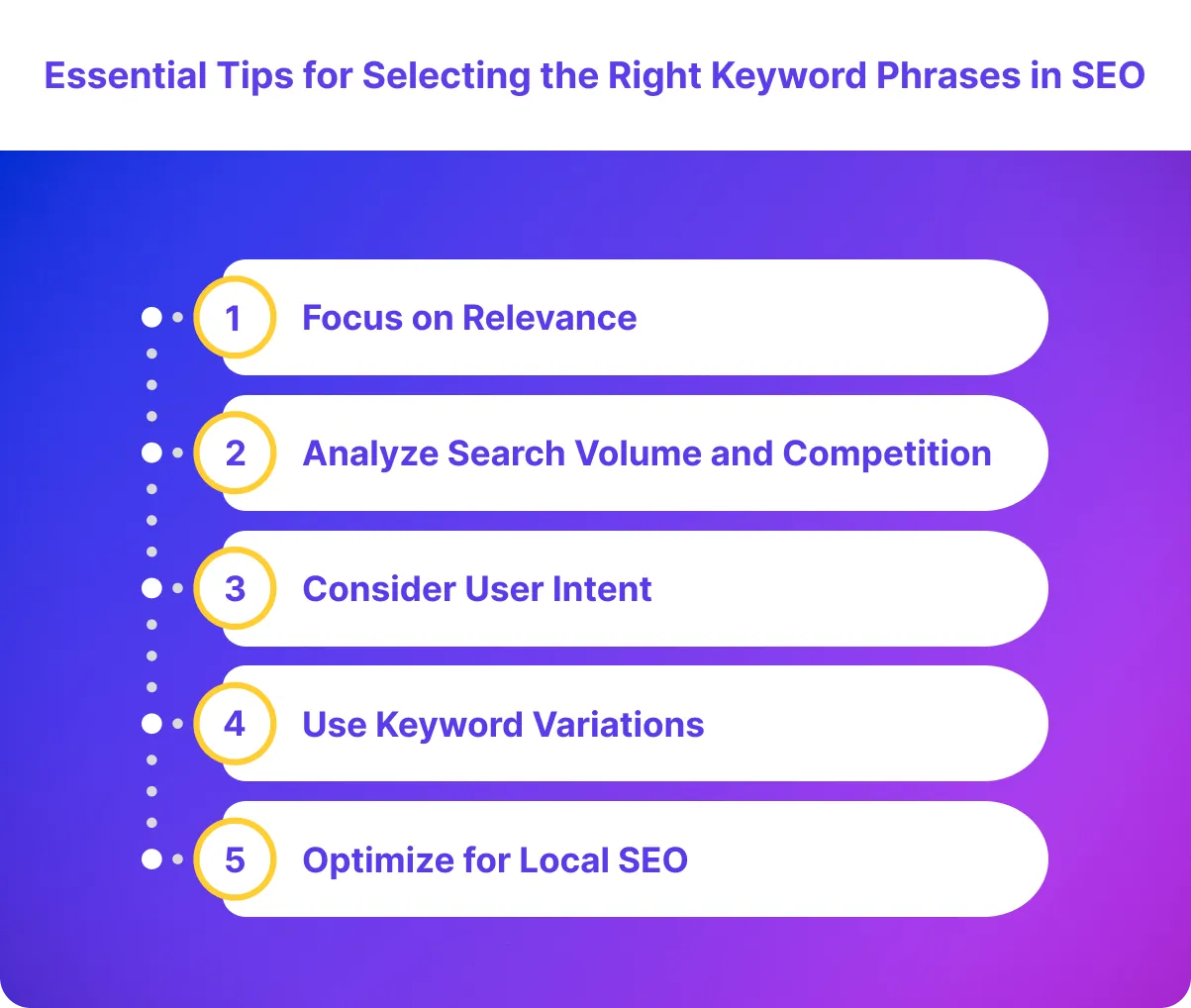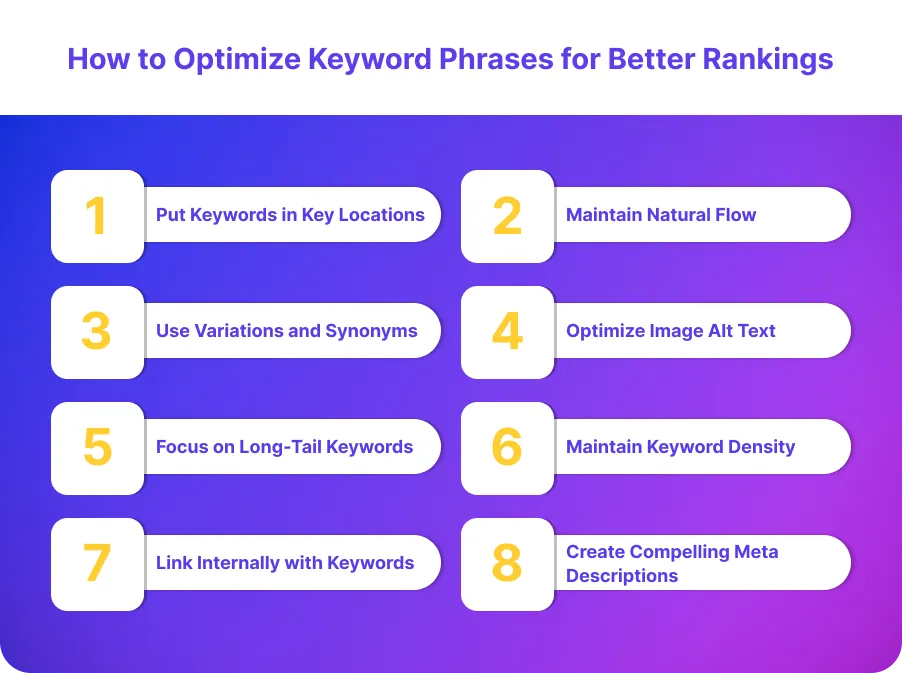What Are Keyword Phrases in SEO and How They Improve Rankings
Discover what keyword phrases in SEO are and how they improve rankings. Learn how to choose keywords to boost your website's visibility and traffic.

Summary:
Understanding keyword phrases in SEO is crucial for any website to improve its visibility. Businesses can significantly enhance their search engine rankings by selecting the right targeted keyword phrases and performing effective keyword research for SEO.
Keyword phrases connect what your audience is searching for with the content you provide. Optimizing your website around the right keywords makes your content more discoverable and ensures it resonates with your target audience.
In this blog, we’ll explore how choosing the right keyword phrases can elevate your search rankings, attract relevant traffic, and help your business stand out in an increasingly competitive online environment.
Why do Keyword Phrases Matter for SEO?
Keyword phrases are crucial for SEO because they help search engines understand what your content is about. When you use relevant keywords, your website is more likely to appear in search results, driving more visitors to your page.
The Role of Keywords in Search Engine Rankings
By focusing on keyword research for SEO and selecting the right SEO keywords and phrases, you can ensure your content aligns with what users are searching for. Here’s how keyword phrases in SEO impact your rankings:

Improve Relevance
Well-optimized keyword phrases help match your content with what users are searching for, improving its relevance and chances of ranking higher.
Better Visibility
Using SEO keyword phrases in key areas like titles, headers, and content helps search engines understand your page, increasing its chances of appearing in search results.
Enhanced User Experience
The right SEO keyword placement guides content creation, offering valuable information that satisfies user intent and keeps visitors engaged.
Boost Rankings
An effective keyword strategy in SEO involves selecting the best SEO keyword selection for your niche, which can directly impact your position in the search engine results page (SERP).
Incorporating the right SEO keyword analysis into your strategy ensures that your pages are optimized for the keywords that matter most, helping you stay competitive in search rankings.
How to Choose the Right Keyword Phrases
Effective keyword research for SEO involves more than just selecting popular terms—it’s about understanding user intent and aligning your content with people searching for. Here are some key tips for selecting the best keyword phrases in SEO:

Focus on Relevance
Ensure the SEO keywords and phrases you choose align closely with your content and audience’s needs. Relevance is key to improving rankings and providing value.
Analyze Search Volume and Competition
Use tools to assess search volume and competition for different keyword phrases. Targeting long-tail keywords can often offer lower competition with higher conversion potential.
Consider User Intent
Think about what users want when they search for a particular keyword. Are they looking for information, a product, or a solution to a problem? Customize your keyword strategy in SEO to meet that intent.
Use Keyword Variations
Incorporate a mix of primary SEO keyword phrases and related variations. This ensures you cover a wider range of potential search queries and rank for multiple related terms.
Optimize for Local SEO
If you’re targeting a specific geographic area, make sure to include location-based keyword phrases in your strategy. This helps improve rankings for local search results.
On-Page Optimization: Using Keyword Phrases Effectively
To get the most out of your SEO keyword phrases, it’s important to use them strategically throughout your content. Here are some best practices for integrating keyword phrases in a way that improves both your rankings and user experience:

Put Keywords in Key Locations
Incorporate your targeted keyword phrases into important areas like the page title, meta description, header tags, and the first 100 words of your content. These areas are highly prioritized by search engines.
Maintain Natural Flow
While it’s important to include SEO keywords and phrases, they should fit naturally into your content. Avoid keyword stuffing, which can negatively affect readability and rankings.
Use Variations and Synonyms
Instead of repeating the same SEO keyword phrases, use related terms and variations. This helps your content appear more natural and can also rank for a broader range of search queries.
Optimize Image Alt Text
Don’t forget to include SEO keywords in your image alt text. This helps search engines understand the content of your images and improves your page’s relevance for specific search terms.
Focus on Long-Tail Keywords
Incorporating long-tail keyword phrases (more specific, longer search terms) into your content can help you rank for less competitive but highly relevant queries. These phrases often convert better as they cater to a more targeted audience.
Maintain Keyword Density
Ensure that your content contains a reasonable density of your targeted SEO keyword phrases. Overusing them can make your content feel unnatural, while underusing them may make it harder for search engines to understand the page’s topic.
Link Internally with Keywords
Use SEO keywords in anchor text for internal links to guide users to related content on your website. This not only improves the user experience but also helps search engines understand the structure and relevance of your site’s content.
Create Compelling Meta Descriptions
Incorporate SEO keyword phrases into your meta descriptions. A well-crafted meta description helps search engines understand your page’s relevance and can encourage more users to click on your link in the search results.
Measuring the Impact of Keyword Phrases on SEO Performance
To ensure your keyword strategy is working effectively, it’s important to track and measure how your keyword phrases in SEO are impacting your website’s performance. Here are key methods to assess and improve your SEO efforts:
1) Tracking Rankings and Traffic
One of the most reliable ways to monitor the effectiveness of your SEO keyword strategy is by using tools like Google Analytics and Google Search Console. These platforms provide valuable data on how well your pages are ranking for targeted keywords and how much traffic they’re generating. By tracking keyword rankings and organic traffic, you can assess whether your SEO keywords are driving the right audience to your site.
2) Adjusting Strategies Based on Data
Regularly check keyword performance. If certain keywords aren’t working, adjust your strategy by updating your keyword choices based on data and trends.
3) Using A/B Testing for Keywords
Experiment with different keyword phrases in similar content to see which one performs better. A/B testing helps you identify the most effective keywords for better results.
By measuring and adjusting based on data, you can improve your keyword strategy and boost SEO performance.
The Future of Keyword Research and SEO Trends
As SEO continues to evolve, staying ahead of emerging trends is key to maintaining strong rankings. Here are some future trends in keyword research and SEO that you should watch out for:
1) Voice Search and its Impact on Keyword Strategy
As voice search becomes more popular, people are using everyday language to search. Long-tail keywords and conversational phrases are becoming more important for capturing voice search traffic. Adapt your keyword strategy by focusing on how people speak, not just how they type.
2) AI and Search Algorithms
New AI technologies, like GPT models, are changing how search engines work. They are getting better at understanding what users actually want, so your keyword strategy should focus on meaning and context, not just exact words.
3) Using Video and Visual Content to Boost SEO
Video and visuals are becoming more important for SEO. As more people use videos, images, and infographics for information, optimizing keywords for these can help improve your rankings. Make sure to focus on things like alt-text, video descriptions, and captions to increase visibility and bring in more visitors.
Conclusion
Keyword phrases in SEO play a crucial role in helping search engines understand and rank your content. By focusing on the right keywords that align with user intent and context, you can improve your website’s visibility and attract more targeted traffic.
It’s important to not just focus on exact matches but also consider how users search for information. By optimizing your content with relevant keyword phrases and following SEO best practices, you’ll be setting yourself up for improved rankings and long-term success. Continue adjusting your strategy to stay competitive in the ever-changing landscape of SEO.